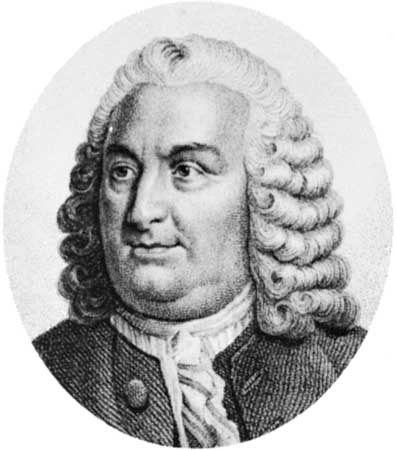Haller, Albrecht von
Swiss biologist
born Oct. 16, 1708, Bern
died Dec. 12, 1777, Bern
 Swiss biologist, the father of experimental physiology, who made prolific contributions to physiology, anatomy, botany, embryology, poetry, and scientific bibliography.
Swiss biologist, the father of experimental physiology, who made prolific contributions to physiology, anatomy, botany, embryology, poetry, and scientific bibliography.At the University of Göttingen (1736–53), where he served as professor of medicine, anatomy, surgery, and botany, Haller undertook the exhaustive biological experimentation that was to make his encyclopaedic Elementa Physiologiae Corporis Humani (8 vol., 1757–66; “Physiological Elements of the Human Body”) a landmark in medical history. Because of his impressive accomplishments at the newly formed university, the scientific world was shocked when he suddenly resigned his chair to return to Bern (1753–77), where he continued his research, maintained a private medical practice, and completed an enormous number of written works.
Haller was the first to recognize the mechanism of respiration and the autonomous function of the heart; he discovered that bile helps to digest fats, and he wrote original descriptions of embryonic development. He also summarized anatomical studies of the genital organs, the brain, and the cardiovascular system. Most important were his contributions to the understanding of nerve and muscle activity. On the basis of 567 experiments (190 were performed by him) Haller was able to show that irritability is a specific property of muscle—a slight stimulus applied directly to a muscle causes a sharp contraction. The experiments also showed that sensibility is a specific property of nerves—a stimulus applied to a nerve does not change the nerve perceptibly but causes the contraction of the muscle connected to it, implying that the nerves carry impulses that produce sensation. Although the English physician Francis Glisson had discussed tissue irritability a century earlier, Haller's complete scientific delineation of nerve and muscle action laid the foundations for the advent of modern neurology.
Toward the end of his life, he devoted much of his time to the cataloging of scientific literature. His Bibliothecae Medicinae Practicae, 4 vol. (1776–88) lists 52,000 publications on anatomy, botany, surgery, and medicine. In a study on Swiss vegetation he developed a system of botanical classification considered more logical than that of his Swedish colleague Carolus Linnaeus, known as the father of modern taxonomy. Haller was also an accomplished poet, and his glorification of the mountains (“Die Alpen”; 1732) helped bring a sense of the awareness of natural wonders to German poetry.
- Fujiwara Takanobu
- Fujiwara Tokihira
- Fujiwara Yorimichi
- Fujiwara Yoshifusa
- Fujiwara Yukinari
- Fukang'an
- Fukaya
- Fukien
- Fukko Shintō
- Fukuda Takeo
- Fukuda Yasuo
- Fukui
- Fukui Kenichi
- Fukuoka
- Fukurokuju
- Fukushima
- Fukuyama
- Fukuyama, Francis
- Fukuzawa Yukichi
- Fulani
- Fulani empire
- Fulbert of Chartres, Saint
- Fulbright, J. William
- Fulbright scholarship
- Fulcher Of Chartres